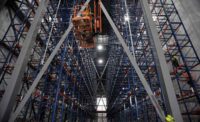The World Bank announced January 14 the debarment of seven firms and one individual for engaging in collusive practices on major Bank-financed roads projects in the Philippines. The World Bank’s Integrity Vice Presidency (INT) uncovered evidence of a major cartel involving local and international firms bidding on contracts under phase one of the Philippines National Roads Improvement and Management Program, known as NRIMP 1. World Bank stopped an estimated $33 million in Bank funds from being awarded to the firms. The World Bank’s Sanctions Board concluded that the entities had participated in a collusive bid-rigging scheme.
The contractors debarred include China Road and Bridge Corp. (eight years), China Geo-Engineering Corp. (five years), and China State Construction Engineering Corp. (six years), all based in Beijing, Fuzhou-based China Wu Yi Co. Ltd. (six years), along with Philippines-based contractors Cavite Ideal International Construction and Development Corp. of Pasay City (four years), CM Pancho Construction, Inc. of Quezon City (four years), and Manila-based E. C. de Luna Construction Corp. and its owner Eduardo C. de Luna (permanent). The debarments can be lessened if the firms put in place compliance programs. However, de Luna and his firm have been permanently debarred. Another firm, Dongsung Construction Co. Ltd., Gyeongnam, Korea, was separately debarred in August 2008 for four years for fraudulent and corrupt practices in relation to the NRIMP 1 case.
NRIMP was designed to assist the Philippines Government to upgrade its roads network and was partially financed by a $150-million loan from the World Bank. It aimed not just to build roads, but also to address weaknesses in project management, so that future roads projects would deliver more benefit at lower cost. As a result of NRIMP 1, which closed in March 2007, 1,400 kilometers of roads were built or resurfaced and management of money for roads within the Dept. of Public Works and Highways was improved. The second phase of the program, which is now underway, has been designed with even tighter anti-corruption mechanisms, including independent procurement evaluation, stronger internal controls and oversight of road construction by a group known as “Road Watch.”
“We detected the possibility of collusion early, we took action to investigate, we worked with the Government of the Philippines to strengthen anti-corruption controls in the next phase of the project and after an extensive and fair process, we have sanctioned the parties involved,” says James Adams, World Bank vice president for East Asia. “This is one of our most important and far-reaching cases, and it highlights the effectiveness of the World Bank’s investigative and sanctions process,” says Leonard McCarthy, World Bank Integrity vice president. He adds that INT was in the process of conducting a worldwide review of the Bank’s activity in the roads sector.



Post a comment to this article
Report Abusive Comment